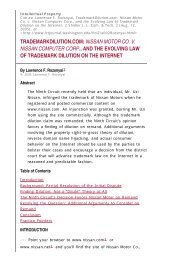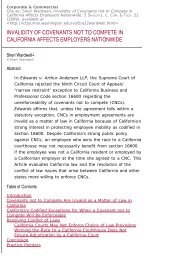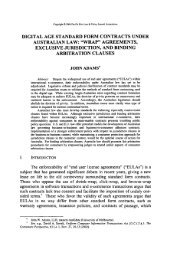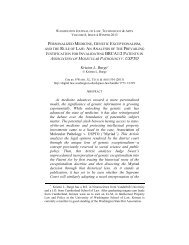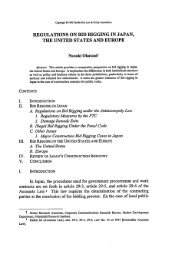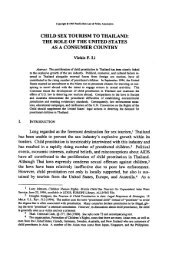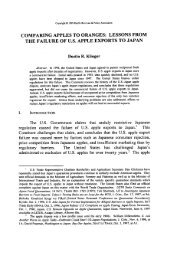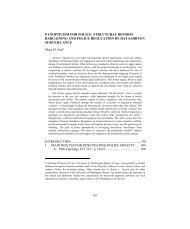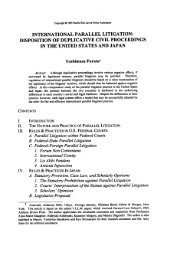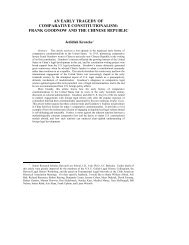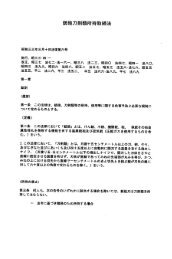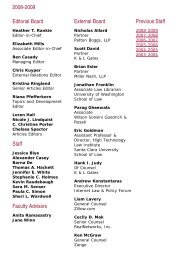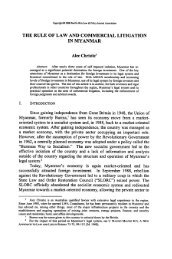the islamic legal system in singapore - University of Washington
the islamic legal system in singapore - University of Washington
the islamic legal system in singapore - University of Washington
Create successful ePaper yourself
Turn your PDF publications into a flip-book with our unique Google optimized e-Paper software.
166 PACIFIC RIM LAW & POLICY JOURNAL VOL. 21 NO. 1<br />
On <strong>the</strong> question <strong>of</strong> what substantive <strong>in</strong>terpretation <strong>of</strong> Islamic law <strong>the</strong><br />
courts should follow, <strong>the</strong> statute is largely silent. 19 In various clauses <strong>in</strong> <strong>the</strong><br />
AMLA, particularly those relat<strong>in</strong>g to marriage and divorces, one f<strong>in</strong>ds time<br />
and aga<strong>in</strong> <strong>the</strong> statement that <strong>the</strong> courts should rule “<strong>in</strong> accordance with<br />
Muslim law.” 20 There is no def<strong>in</strong>ition <strong>of</strong> Muslim law. 21 The ambiguity<br />
about where, precisely, “Muslim law” is to be found becomes more strik<strong>in</strong>g<br />
<strong>in</strong> those passages where AMLA’s requirement that judges resolve cases “<strong>in</strong><br />
accordance with Muslim law” is followed by <strong>the</strong> qualify<strong>in</strong>g phrase ‘‘and<br />
modified, where applicable, by Malay custom”. 22 The majority <strong>of</strong> Muslims<br />
<strong>in</strong> S<strong>in</strong>gapore are Sunni Muslims, who subscribe to <strong>the</strong> Shafi‛i (Malay:<br />
Syafi‛i) school <strong>of</strong> Islamic <strong>legal</strong> <strong>in</strong>terpretation (madhhab). 23 There is every<br />
reason to believe that <strong>the</strong> drafters <strong>of</strong> <strong>the</strong> AMLA expected <strong>the</strong> Syariah courts<br />
<strong>in</strong> <strong>in</strong>dependent S<strong>in</strong>gapore, for <strong>the</strong> most part, to follow Shafi‛i<br />
<strong>in</strong>terpretations. 24 However, it was probably <strong>in</strong>tentional that this was not<br />
spelled out, so as to allow for <strong>the</strong> possibility that <strong>the</strong> Syariah courts might<br />
choose <strong>in</strong> certa<strong>in</strong> circumstances to follow <strong>the</strong> lead <strong>of</strong> o<strong>the</strong>r schools <strong>of</strong><br />
<strong>in</strong>terpretation. 25<br />
In some areas, <strong>the</strong> AMLA specifies <strong>the</strong> actual substantive<br />
<strong>in</strong>terpretation <strong>of</strong> Islamic law that judges should follow. 26 In <strong>the</strong> section on<br />
judicial dissolution <strong>of</strong> marriage (faskh), for example, <strong>the</strong> AMLA specifies<br />
<strong>the</strong> acceptable grounds for dissolution. 27 Also, <strong>the</strong>re is a section sett<strong>in</strong>g forth<br />
<strong>the</strong> books or sources <strong>of</strong> law upon which a judge can rely <strong>in</strong> determ<strong>in</strong><strong>in</strong>g<br />
disputes on <strong>in</strong>heritance and succession. 28<br />
The AMLA sets out <strong>the</strong> powers and ambit <strong>of</strong> <strong>the</strong> key Muslim<br />
<strong>in</strong>stitutions <strong>in</strong> <strong>in</strong>dependent S<strong>in</strong>gapore <strong>in</strong> outl<strong>in</strong><strong>in</strong>g <strong>the</strong> structure and authority<br />
<strong>of</strong> three key Islamic <strong>in</strong>stitutions: <strong>the</strong> Islamic Religious Council (Majlis<br />
Ugama Islam S<strong>in</strong>gapura or “MUIS”), <strong>the</strong> Registry <strong>of</strong> Muslim Marriages<br />
19<br />
Id. at 10.<br />
20<br />
See, e.g., AMLA, § 52(2) (payment <strong>of</strong> a consolatory gift or mutaah upon divorce).<br />
21<br />
See generally AMLA.<br />
22<br />
See id. § 112 (distribution <strong>of</strong> <strong>the</strong> Muslim’s estate).<br />
23<br />
ISLAMIC FAMILY LAW IN A CHANGING WORLD: A GLOBAL RESOURCE BOOK 1, 5 (Abdullahi A<br />
An-Na’im ed. 2002).<br />
24<br />
AMLA, § 33 (specify<strong>in</strong>g that <strong>the</strong> authorities to be followed <strong>in</strong> issu<strong>in</strong>g any rul<strong>in</strong>g <strong>of</strong> <strong>the</strong> fatwa<br />
committee shall ord<strong>in</strong>arily follow <strong>the</strong> tenets <strong>of</strong> <strong>the</strong> Shafi‛i school <strong>of</strong> law).<br />
25<br />
Id. § 33(2) (provid<strong>in</strong>g that where <strong>the</strong> follow<strong>in</strong>g <strong>of</strong> <strong>the</strong> tenets <strong>the</strong> Shafi‛i school <strong>of</strong> law will be<br />
opposed to public <strong>in</strong>terest, tenets <strong>of</strong> any o<strong>the</strong>r accepted schools <strong>of</strong> Muslim law may be followed).<br />
26<br />
Id. § 49.<br />
27<br />
Id.<br />
28<br />
Id. § 114. Section 114 lists <strong>the</strong> texts 1) <strong>the</strong> English translation <strong>of</strong> <strong>the</strong> Quran by A. Yusuf Ali or<br />
Marmaduke Pickthall; 2) Mohammedan Law by Syed Ameer Ali; 3) M<strong>in</strong>haj et Talib<strong>in</strong> by Nawawi,<br />
translated by E. C. Howard from <strong>the</strong> French translation <strong>of</strong> Van den Berg; 4) Digest <strong>of</strong> Moohummudan Law<br />
by Neil B. E. Baillie; 5) Anglo-Muhammadan Law by Sir Roland Knyvet Wilson, 6th Edition Revised by A.<br />
Yusuf Ali; 6) Outl<strong>in</strong>es <strong>of</strong> Muhammadan Law by A. A. Fyzee; and 7) Muhammadan Law by F. B. Tyabji.



